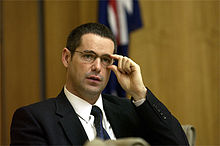- Minister for Broadband, Communications and the Digital Economy (Australia)
-
Minister for Broadband, Communications and the Digital Economy Style The Honourable Appointer Governor-General on the recommendation of the Prime Minister of Australia Inaugural holder John Forrest Formation 1901 The Minister for Broadband, Communications and the Digital Economy is currently Senator the Hon Stephen Conroy. He replaced Senator the Hon Helen Coonan (Minister for Communications, Information Technology and the Arts) on 3 December 2007.
Contents
Portfolio
The current Minister, Stephen Conroy has overall responsibility for all of the matters falling within the Communications and Information Technology industry:
- Broadcasting
- Information and Communications Technology Industry
- Information economy
- Telecommunications
Agency and bodies
Portfolio agencies and bodies include:
- Department of Broadband, Communications and the Digital Economy
- Australian Broadcasting Corporation
- Australian Communications and Media Authority
- Australian Postal Corporation
- Special Broadcasting Service
- NBNCo
The Communications Department was also responsible for Telstra until 1997 when the then new Howard Government decided to privatize it completely. The Australian Government has recently bought back infrastructure from its former agency, Telstra in order to decrease the cost of construction of the National Broadband Network to taxpayers.
Australian Postmasters-General and Ministers for Communications
The minister responsible for telecommunications policy has had various titles but from 1901 until December 1975 it was always Postmaster-General, in charge of the Postmaster-General's Department.
Minister Party affiliation Period Ministerial Title John Forrest Protectionist 1901 Postmaster-General James Drake 1901–1903 Philip Fysh 1903–1904 Hugh Mahon Labor 1904 Sydney Smith Free Trade 1904–1905 Austin Chapman Protectionist 1905–1902 Samuel Mauger 1907–1908 Josiah Thomas Labor 1908–1909 John Quick Commonwealth Liberal 1909–1910 Josiah Thomas Labor 1910–1911 Charles Frazer 1911–1913 Agar Wynne Commonwealth Liberal 1913–1914 William Spence Labor 1914–1915 William Webster Labor/Nationalist 1915–1920 George Wise Nationalist 1920–1921 Alexander Poynton 1921–1923 William Gibson 1923–1929 Joseph Lyons Labor 1929–1931 Albert Green 1931–1932 James Fenton United Australia 1932 Archdale Parkhill 1932–1934 Alexander McLachlan 1934–1938 Archie Cameron Country 1938–1939 Eric Harrison United Australia 1939–1940 Harold Thorby 1939–1940 George McLeay 1940–1941 Thomas Collins 1941 Bill Ashley Labor 1941–1945 Don Cameron 1945–1949 Larry Anthony Country 1949–1956 Charles Davidson 1956–1963 Alan Hulme Liberal 1963–1972 Lionel Bowen Labor 1972–1974 Reg Bishop 1974–1975 Peter Nixon National Country 1975–1975 Victor Garland Liberal 1975–1976 Minister for Post and Telecommunications Eric Robinson 1976–1977 Tony Staley 1977–1980 Ian Sinclair National Country 1980–1982 Minister for Communications Neil Brown Liberal 1982–1983 Michael Duffy Labor 1983–1987 Gareth Evans 1987–1988 Minister for Transport and Communications Ralph Willis 1988–1990 Kim Beazley 1990–1991 John Kerin 1991 Graham Richardson 1991–1992 Bob Collins* 1992–1993 David Beddall* 1993 Minister for Communications Michael Lee 1993–1994 1994–1996 Minister for Communications and the Arts Richard Alston Liberal 1996–1997 1997–1998 Minister for Communications, the
Information Economy and the Arts1998–2003 Minister for Communications,
Information Technology and the ArtsDaryl Williams 2003–2004 Helen Coonan 2004–2007 Stephen Conroy Labor 2007– Minister for Broadband, Communications
and the Digital Economy- David Beddall was a junior minister who had served concurrently as Minister For Communications with his Cabinet colleague, Transport and Communications Minister Bob Collins from 24 March to 24 December 1993.
See also
External links
Categories:- Lists of government ministers of Australia
- Communication ministers
Wikimedia Foundation. 2010.

